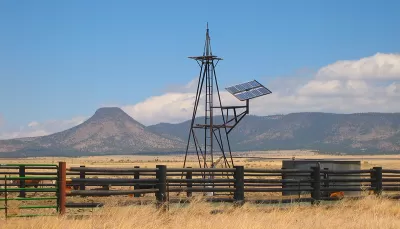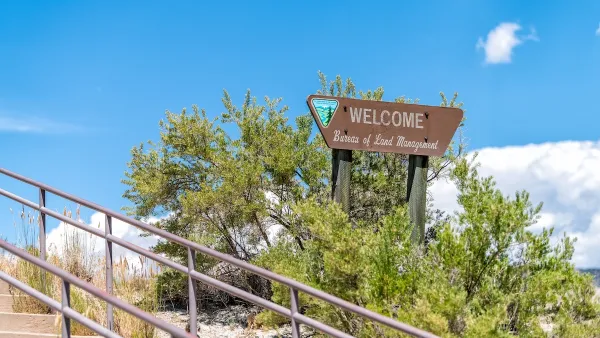Unlike energy issues that will appear in the form of ballot initiatives on Tuesday in three western states, voters in New Mexico will cast their energy vote in their choice for state land commissioner, an arcane position with considerable authority.

In Washington, a carbon fee is on the ballot; in Arizona and Nevada, initiatives on renewable portfolio standards, and in Colorado, a familiar issue, an oil and gas drilling initiative.
By contrast, there are no energy initiatives on the New Mexico state ballot on election day. Instead, matters of energy production will be contested by election of a New Mexico Public Lands Commissioner.
"The race for the state's next land commissioner, a position that oversees an area larger than 9 U.S. states, is viewed as crucial to determining the state's energy future," reports Nathan Rott for NPR. "And it could have an even wider impact on the region's economy and the global climate."
As head of the State Land Office, the commissioner manages 9 million acres of state trust lands, approving developments like oil and gas drilling, ranching and renewable energy projects.
"The land commissioner can sell the land, lease the land or trade the land without anybody else's approval, which is unlike any other constitutional office I've heard of," says Ray Powell, who served in the position longer than anyone else in state history.
That autonomy, he says, makes the position attractive to interest groups and industry, particularly oil and gas.
Oil and gas drilling is a booming business in New Mexico, thanks to productive reservoirs in the Permian Basin in southeastern New Mexico, now the third largest oil producer after Texas and North Dakota.
Longtime political analysts and pollsters say the spending in this year's land commission race is unprecedented.
Chevron has put $2 million into a political action committee that's supporting Patrick Lyons, a Republican, who served as land commissioner from 2003 to 2010.
The League of Conservation Voters, a national conservation group, and local environmental organizations are putting their support behind Stephanie Garica Richard, a Democratic state legislator who has promised to hold oil and gas accountable.
And there's a third candidate, Michael Lucero (Libertarian). "Lyons and Garcia Richard are neck-and-neck," adds Rott. The current office holder is Libertarian Aubrey Dunn.
There's another important dimension to the State Land Office—revenues go to the state land trust, which benefits "schools, universities, hospitals and other important public institutions," according to its website.
By leasing state trust land for a wide array of uses, the Land Office generates hundreds of millions of dollars each year to support these beneficiaries while saving the average household about $800 in taxes.
Like many NPR articles, there's an audio version available. To listen to related NPR reporting, see their environment and energy collaborative.
Hat tip to InsideClimate News.
FULL STORY: Why Big Money Is Being Pumped Into A Small New Mexico Race

Planetizen Federal Action Tracker
A weekly monitor of how Trump’s orders and actions are impacting planners and planning in America.

San Francisco's School District Spent $105M To Build Affordable Housing for Teachers — And That's Just the Beginning
SFUSD joins a growing list of school districts using their land holdings to address housing affordability challenges faced by their own employees.

The Tiny, Adorable $7,000 Car Turning Japan Onto EVs
The single seat Mibot charges from a regular plug as quickly as an iPad, and is about half the price of an average EV.

Trump Approves Futuristic Automated Texas-Mexico Cargo Corridor
The project could remove tens of thousands of commercial trucks from roadways.

Austin's First Single Stair Apartment Building is Officially Underway
Eliminating the requirement for two staircases in multi-story residential buildings lets developers use smaller lots and more flexible designs to create denser housing.

Atlanta Bus System Redesign Will Nearly Triple Access
MARTA's Next Gen Bus Network will retool over 100 bus routes, expand frequent service.
Urban Design for Planners 1: Software Tools
This six-course series explores essential urban design concepts using open source software and equips planners with the tools they need to participate fully in the urban design process.
Planning for Universal Design
Learn the tools for implementing Universal Design in planning regulations.
Smith Gee Studio
City of Charlotte
City of Camden Redevelopment Agency
City of Astoria
Transportation Research & Education Center (TREC) at Portland State University
City of Camden Redevelopment Agency
Municipality of Princeton (NJ)





























